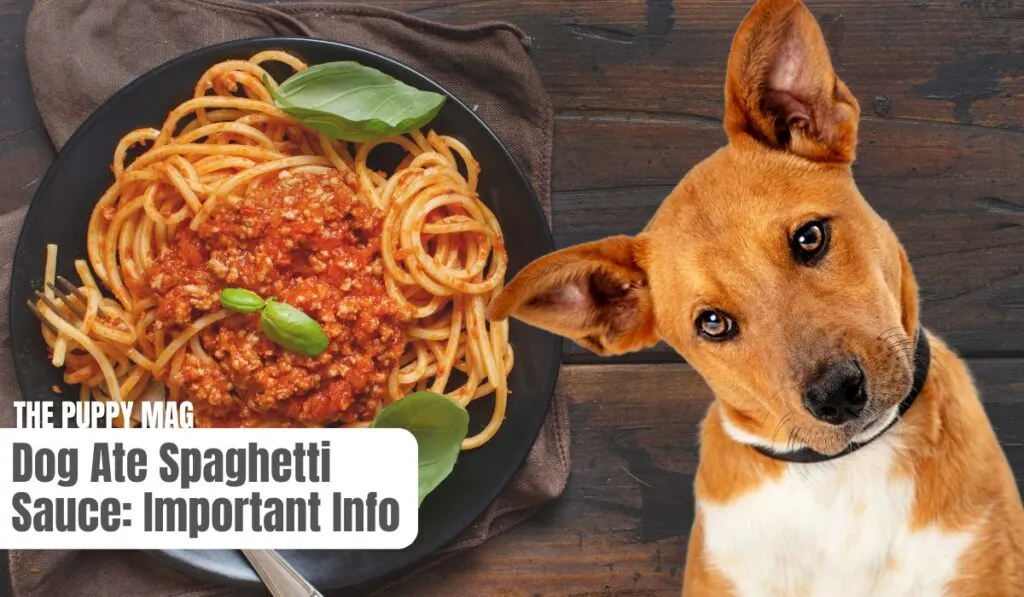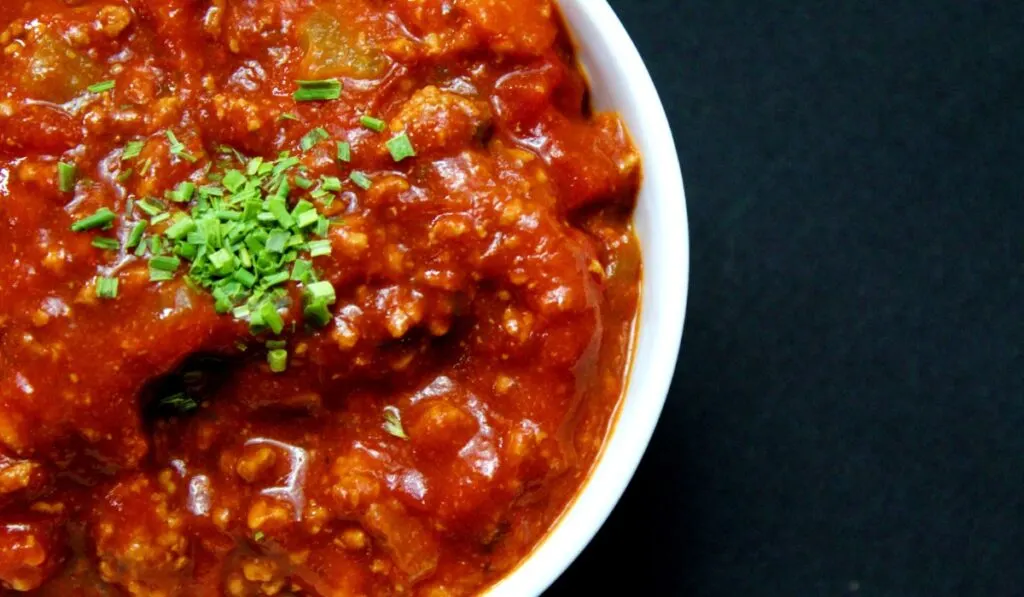There’s a lot of worry that comes with your furry friend getting into something they shouldn’t. And spaghetti sauce is definitely on the list of something “they shouldn’t!”
One common concern is when your dog eats something they shouldn’t, like spaghetti sauce.
In this article, I’ll cover everything you need to know about what to do if your dog has eaten spaghetti sauce.
This has actually happened to my dog before, and after speaking with other owners and getting quick advice from our resident vet here at The Puppy Mag, I thought it’s important to share the information below.

Why spaghetti sauce is bad for your dog
Spaghetti sauce contains several ingredients that are not only unhealthy but can also be toxic to dogs. Some of these ingredients include:
- Onions and garlic: Spaghetti sauce usually contains onions and garlic, which can damage a dog’s red blood cells and lead to anemia. Anemia is a condition where there are not enough red blood cells to carry oxygen to the body’s tissues, and can cause lethargy, weakness, pale gums, and other symptoms.
- Salt: Most spaghetti sauce contains a lot of salt, which can cause dehydration and sodium ion poisoning in dogs. Symptoms of sodium ion poisoning include vomiting, diarrhea, lethargy, tremors, seizures, and even death.
- Tomatoes: While not necessarily toxic, tomatoes contain solanine, which can be harmful to dogs in large quantities. Solanine is a toxin that can cause gastrointestinal upset, including vomiting and diarrhea, as well as lethargy, weakness, confusion, and even death in severe cases.
- Spices: Spices used in spaghetti sauce such as red pepper flakes, oregano, and basil can cause gastrointestinal upset and even inflammation of the liver. Inflammation of the liver can cause symptoms such as vomiting, diarrhea, abdominal pain, and jaundice.
Reference Source Humane Society: Toxic food for dogs
Signs of symptoms of illness after eating spaghetti sauce

If your dog has eaten spaghetti sauce, they may exhibit various symptoms of illness.
Some of the most common signs of illness include:
Vomiting and diarrhea:
These are the most common symptoms of gastrointestinal upset in dogs. If your dog has eaten spaghetti sauce and is vomiting or has diarrhea, it is important to monitor their condition closely and contact your veterinarian if the symptoms persist.
Loss of appetite:
Dogs that have eaten something they shouldn’t may lose their appetite. If your dog is refusing to eat or drink water, it is essential to monitor their condition closely and contact your veterinarian if the symptoms persist.
Lethargy and weakness:
Dogs that have ingested toxic substances may exhibit lethargy and weakness. If your dog is unusually tired or has difficulty standing up or walking, it is essential to monitor their condition closely and contact your veterinarian if the symptoms persist.
Foaming at the mouth:
A classic symptom of poisining in dogs is foaming at the mouth. If you notice this directly after your dog has eaten spaghetti sauce there’s a good chance she has ingested too much for her body to handle. Related: Puppy Foaming at Mouth & Shaking
Increased thirst and urination:
If your dog has ingested too much salt, they may become dehydrated and exhibit increased thirst and urination. It is essential to monitor your dog’s water intake and urination closely and contact your veterinarian if the symptoms persist.
Elevated heart rate:
If your dog has ingested toxic substances, their heart rate may become elevated. An elevated heart rate can cause symptoms such as panting, restlessness, and anxiety.
Pale gums:
If your dog has anemia, their gums may become pale due to a lack of red blood cells. If your dog’s gums are pale, it is essential to contact your veterinarian immediately.
Red or brown urine:
If your dog has ingested toxic substances, they may exhibit red or brown urine due to the presence of blood or other toxins in their urine. If your dog’s urine is discolored, it is essential to contact your veterinarian immediately.
Reference Source: ASPCA: Poisining symptoms in dogs
When to take your dog to the vet or emergency animal center
If you suspect that your dog has eaten spaghetti sauce and is exhibiting any of the symptoms above, it is crucial to contact your veterinarian immediately.
Depending on the severity of your dog’s condition and developed symptoms, your veterinarian may recommend bringing your dog in for an examination and treatment.
If your dog has ingested a large amount of spaghetti sauce or is exhibiting severe symptoms, you may need to take them to an emergency animal center. Emergency animal centers are open 24/7 and can provide immediate care and treatment for your pet.
➡️ If you are unsure whether your dog requires medical attention, it is always better to err on the side of caution and contact your veterinarian. They can advise you on the best course of action based on your dog’s symptoms and medical history.
Dog breeds most vulnerable to toxic ingredients

Some dog breeds are more vulnerable to the toxic ingredients found in spaghetti sauce than others.
These breeds include:
- Shih Tzus: Shih Tzus are susceptible to anemia caused by onions and garlic. Their small size and delicate digestive systems make them more vulnerable to toxicity.
- Australian Shepherds: Australian Shepherds are prone to sodium ion poisoning due to their high energy levels and tendency to drink large amounts of water.
- Greyhounds: Greyhounds have a high risk of developing anemia due to their low red blood cell counts.
- Boxers: Boxers are susceptible to liver inflammation caused by spicy foods and spices such as red pepper flakes and oregano.
- Pugs: Pugs are prone to sodium ion poisoning due to their small size and tendency to drink large amounts of water.
So, if I’ve listed your breed above you might want to consider calling your veterinarian right away just be safe.
Some dogs are more tolerable at handling toxic ingredients and flushing them through their system without serious adverse affects. Some breeds aren’t so lucky.
Can dogs eat plain spaghetti?
While spaghetti sauce is not safe for dogs, plain spaghetti is generally safe for dogs to eat in small quantities.
Spaghetti is a source of carbohydrates, which can provide energy for dogs. But truthfully, spaghetti is not exactly a healthy source of carbohydrates, and so dogs are still better off not eating it.
If you do decide to feed your dog plain spaghetti, be sure to cook it thoroughly and avoid adding any sauces or spices.
It is also essential to monitor your dog’s portion sizes, as overfeeding can lead to weight gain and other health problems.
My personal experience
As a dog owner, I have had my fair share of experiences with dogs ingesting things they shouldn’t.
One time, my dog got into a jar of spaghetti sauce that I had left on the counter. I panicked and immediately called my veterinarian, who advised me to monitor my dog’s symptoms and bring him in if they persisted.
Luckily, my dog did not exhibit any severe symptoms, and after monitoring him closely for a few hours, he was back to his usual self.
However, this experience taught me not to leave tasty (smelly) things within my dog’s reach. Yep, I trained them, but boy do they still surprise me!
Last thoughts
If your dog has eaten spaghetti sauce, it is essential to monitor their symptoms closely and contact your veterinarian if they exhibit any signs of illness.
Spaghetti sauce contains several toxic ingredients that can be harmful to dogs, including onions and garlic, salt, tomatoes, and spices.
Some dog breeds, such as Shih Tzus and Australian Shepherds, are more vulnerable to the toxic effects of these ingredients.
While plain spaghetti is generally safe for dogs to eat in small quantities, it should not make up a significant portion of their diet. If you suspect that your dog has ingested something toxic, it is always better to err on the side of caution and contact your veterinarian for advice.
